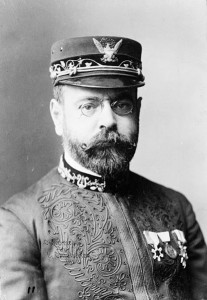Sousa, The Washington Post March
I was a band guy (“geeks” hadn’t been invented yet). After doing all the usual band stuff throughout high school and into my college years, I found myself in an Army band for three years. Along the way, I played some unimaginable number of marches.
And I still like th em. Not just as some kind of nostalgia for lost youth or because they appeal to my appreciation for order and form. Yes, they are formulaic, but you can say the same about many musical forms. And yes, they are crowd-pleasers, but that doesn’t mean the crowd is wrong to enjoy them.
em. Not just as some kind of nostalgia for lost youth or because they appeal to my appreciation for order and form. Yes, they are formulaic, but you can say the same about many musical forms. And yes, they are crowd-pleasers, but that doesn’t mean the crowd is wrong to enjoy them.
Marches caught on in European military circles in large part from contact with the Janissary bands of the Ottoman Empire. (We mentioned this Turkish influence just two weeks ago concerning a work by Rameau.) Marches served several military purposes. They helped troops march in military formation and also boosted morale. The band frequently took to the battlefield, not just as drummers and buglers for signaling, but to keep soldiers feeling just a little better about their circumstances.
John Philip Sousa (1854-1932) has a legitimate claim on the title “The March King.” You are probably familiar with many of his marches, but he was also successful at writing operettas. Our friend David Lovrien of the Dallas Wind Symphony maintains a web site devoted to Sousa that has a wealth of information.
Since we are about to celebrate Washington’s Birthday, it seems like a reasonable, if feeble, excuse to feature a march in this series. Sousa’s The Washington Post March (1889) was not written to commemorate anything about George Washington, but rather for an essay contest awards ceremony for the newspaper bearing that name.



